2017届高考英语北师大版一轮复习教案:选修6 Unit 16 Stories Word版含解析
新高考英语一轮复习Unit16Stories教学案北师大版选修6

Unit 16 Stories核心单词1.loss n.遗失,丢失2.burst vi.爆炸;冲,闯3.witness vt.&vi.亲见,目击;为……作证4.occur vi.发生,出现;被想起5.discourage vt.使泄气,使灰心6.severe adj.严重的;严厉的7.apparent adj.明显的,显而易见的8.suffering n.痛苦,困难9.gradual adj.逐渐的10.abandon vt.放弃,遗弃11.victim n.受害者12.tremble vi.颤抖,发抖13.particularly adv.特别地;特定地14.characteristic adj.典型的15.monument n.纪念碑,纪念堂16.gather vi. & vt.聚集17.sorrow n.悲伤,难过18.sympathy n.同情19.significance n.重要性;意义20.violinist n.小提琴家21.origin n.起源,开端;出身22.admirable adj.令人钦佩的23.former adj.以前的24.precious adj.宝贵的,珍贵的25.eager adj.渴望的,热衷的26.expand v.扩大,扩充27.warmth n.温暖28.clumsy adj.笨拙的;不得体的[语境运用] 用所给词的适当形式填空。
1.He wasn't discouraged(discourage) when they threw cold water on his ideas.2.She was shocked by the violent scenes she had_witnessed(witness).3.The idea occurred (occur) to him in a dream.4.You have to feel for the sufferings(suffering) of others.5.Every now and then you hear some bombs bursting(burst).6.The closure of the factory will lead to a number of job losses(loss).拓展单词1.abandon vt.放弃,遗弃→abandoned adj.被抛弃的,被遗弃的2.preserve vt.保护,保存→preservation n.保存;保留3.wit n.机智,风趣;能力,智力→witness v.目击4.occur vi.发生→occurrence n.发生5.particularly adv.特别地,特定地→particular adj.特别的,特定的,特有的6.character n.性格;人物→characteristic adj.典型的n.特点,特征7.significant adj.重大的,有意义的→significance n.重要性;意义8.normal adj.正常的,通常的→abnormal adj.反常的,不正常的9.origin n.起源,开端;出身→original adj.最初的,起源的10.bear v.忍受→bearable adj.可忍受的→unbearable adj.不能忍受的[语境运用] 用所给词的适当形式或所给提示填空。
2017届高考英语一轮复习教师用书北师大版选修6
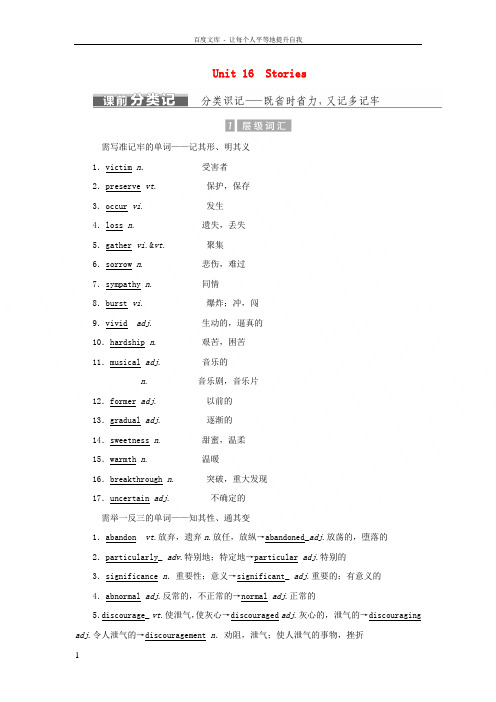
Unit 16 Stories需写准记牢的单词——记其形、明其义1.victim n.受害者2.preserve vt. 保护,保存3.occur vi. 发生4.loss n. 遗失,丢失5.gather vi.&vt. 聚集6.sorrow n. 悲伤,难过7.sympathy n. 同情8.burst vi. 爆炸;冲,闯9.vivid adj. 生动的,逼真的10.hardship n. 艰苦,困苦11.musical adj. 音乐的n. 音乐剧,音乐片12.former adj. 以前的13.gradual adj. 逐渐的14.sweetness n. 甜蜜,温柔15.warmth n. 温暖16.breakthrough n. 突破,重大发现17.uncertain adj. 不确定的需举一反三的单词——知其性、通其变1.abandon vt.放弃,遗弃n.放任,放纵→abandoned_adj.放荡的,堕落的2.particularly_ adv.特别地;特定地→particular adj.特别的3.significance n.重要性;意义→significant_ adj.重要的;有意义的4.abnormal adj.反常的,不正常的→normal adj.正常的5.discourage_ vt.使泄气,使灰心→discouraged adj.灰心的,泄气的→discouraging adj.令人泄气的→discouragement n.劝阻,泄气;使人泄气的事物,挫折6.admirable adj.令人钦佩的→admire vt.钦佩7.unbearable adj.不能忍受的→bearable adj.可忍受的→bear vi.容忍,忍受8.troublesome adj.引起麻烦的→trouble vt.惹麻烦n.麻烦,毛病9.eager adj.渴望的,热衷的→eagerly_ adv.渴望地,热衷地10.expand v.扩大,扩充→expansion n.扩张需会读明义的单词——识其形、知其义1.biography n.传记2.fantasy n. 想象(幻想)物3.princess n. 公主,王妃4.criteria n. (评判的)标准5.novelist n. (长篇)小说家6.capsule n. 胶囊;太空舱7.tremble vi. 颤抖,发抖8.awesome adj. 令人敬畏的9.rewind vi.&vt. 倒回10.architecture n. 建筑11.authentic adj. 原作的;真正的12.characteristic adj. 典型的13.monument n. 纪念碑,纪念堂14.specific adj. 详细的;特定的15.violinist n. 小提琴家16.origin n. 起源,开端;出身17.suffering n. 痛苦,困难18.tease vt. 嘲笑,取笑19.superb adj. 出色的,卓越的20.severe adj. 严重的,严厉的21.restriction n. 限制,约束22.stubborn adj. 倔强的,固执的23.straightforward adj. 直接的;坦率的24.precise adj. 准确的,精确的25.imitation n. 模仿26.precious adj. 宝贵的,珍贵的27.complex adj. 复杂的28.apparent adj. 明显的,显而易见的29.tiresome adj. 讨厌的,令人厌倦的30.awkward adj. 笨拙的,令人不舒服的31.spill vi.&vt. 洒出,溅出32.tense adj. 紧张的33.dizzy adj. 头晕目眩的34.applaud vi.&vt. 鼓掌35.clumsy adj. 笨拙的;不得体的1.come_into_view 出现2.knock_sb._over 撞倒某人3.block_out _ 堵住4.in_a_way 从某种程度上说5.on_one's_side 侧身6.split_up_ (使)解散;决裂7.name_...after 以……的名字给……命名8.hold_up 支撑起9.count_on 依靠10.figure_out 理解,弄清楚11.put_up_with 容忍,忍受12.in_particular 特别,尤其13.now_that 既然,由于1.[教材原句]Pliny described a cloud coming down the mountain, blocking_out the sun and burying everything in its path, including whole villages and towns.普利尼描述道,一团云自山巅而降,遮天蔽日,将所经之处的一切,包括一座座村庄和城镇统统吞没。
2017版高考英语一轮复习Unit16Stories教学案北师大版选修6

Unit 16 StoriesⅠ.核心单词→识记·思考·运用一、单词拼写1.*(2015·安徽,阅读B)Their ________(扩大)business became a large corporation in 1996.2.He is easily ________(使灰心) by difficulties and obstacles.3.*(2015·重庆,阅读 E )History has ________(目睹)the endless productions of Shakespearean plays in every major language of the world.4.The shy girl felt ________(笨拙的) and uncomfortable.5.(2014·重庆,阅读A)All of a sudden,a warm feeling of ________ (同情)rose up in my heart.6.*He had to ________(放弃) his research for lack of funds.7.(2014·安徽,阅读D) However,there may be other reasons why they should be ________(保护).8.Joe was ________(固执的) and would not listen to any reason.9.Our train leaves at half past nine—9:33 to be ________(准确的).10.(2015·陕西,满分作文)I really want to obtain this ________(宝贵的) opportunity. 答案 1.expanding 2.discouraged 3.witnessed 4.awkward 5.sympathy 6.abandon7.preserved 8.stubborn 9.precise 10.precious二、用所给词的适当形式填空1.(2015·安徽,阅读E)The foods we eat—and when and how we eat them—are often unique to a ________(particularly)culture.2.John is smart,polite,and well-behaved.In a word,he is ________(admire). 3.We were very surprised at his ________(normal) behavior.4.He was ________(apparent)much surprised at the news.5.The swimming club is open to families in the neighborhood without________(restrict).6.That plane crash ________(occur) only minutes after take-off.7.Some of the old ________(fantastic) about the space age are coming true. 8.Nowadays,many old customs are ________(gradual) dying out.9.Most people think it ________,although a few members haven't known the ________ of the matter.(significance)10.We must learn how to ________ everything,and we should make it ________,although it is ________ sometimes.(bear)11.The old soldier's health ________ greatly from all the ________ that he went through during the war.(suffer)答案 1.particular 2.admirable 3.abnormal 4.apparently 5.restriction6.occurred7.fantasies8.gradually9.significant;significance 10.bear;bearable;unbearable 11.suffered;sufferings三、开心词场An accident occurred at 5 pm yesterday.A nine-year-old girl was knocked over by a truck on her way to school,and to our sorrow,she was dead on the spot.Hearing the news,the girl's mother burst out crying.She didn't know how it came about.The witness told the police that the driver abandoned his truck and escaped from the spot.All the relatives and neighbors couldn't put up with the driver's cruelty.And they all counted on the police to help them.【联想·积累】❶expand相关短语个个清①expand into (使……)扩大成……②expand in 在……方面增加/膨胀③expand on/upon 详述,详细阐明❷“看”遍天下①notice 注意到,留心②observe 观察③watch 观看,关注④stare (at) 凝视,盯着看⑤glance (at) 匆匆看一眼;瞥⑥glare (at) 怒视⑦peer 窥视,凝视⑧witness 目击,目睹❸“停止,放弃,舍弃”集合①pause②stop③abandon④quit⑤give up⑥desert❹词汇拓展①suffering n.痛苦,困难→suffer v.遭受,患(某种病)②discoura ge vt.使泄气,使灰心→discouraged adj.气馁的,泄气的→courage n.勇气→encourage vt.鼓励③unbearable adj.不能忍受的→bearable adj.可忍受的→bear v.忍耐④musical adj.音乐的→music n.音乐→musician n.音乐家⑤origin n.起源,开端;出身→original adj.最初的;起先的Ⅱ.重点短语→识记·思考·运用一、补全短语1.once ________ a time 从前2.________ a way 从某种程度上说3.________ one's side 侧身4.split ________ 断绝关系;分成小部分5.name...________ 以……命名6.________ particular 特别,尤其7.on the way ________ 在去……的路上8.________ rise 增加工资答案 1.upon 2.in 3.on 4.up 5.after 6.in 7.to 8.pay二、短语填空1.The building work has been ____________ by the bad weather.2.I ____________ one of my old friends when I went shopping yesterday afternoon. 3.I really don't know how they ____________ such extreme condition.4.When the car goes around the corner,our house will ____________.5.You can ____________ a dictionary when you come across a new word.6.All they did was ____________ the light.7.Remember stress does go away,especially when you ____________ the problem and start working on solving it.8.If you don't slow down,you'll ____________ in hospital.9.You can ____________ him because he is a reliable man.10.A boy was ____________ by a passing car but fortunately he was not hurt severely. 答案 1.held up 2.came across 3.put up with e into view 5.refer to 6.block out 7.figure out 8.end up 9.count on 10.knocked over,【联想·积累】❶“查字典”的多种表达①refer to the dictionary②look up a word in the dictionary③consult the dictionary④turn to the dictionary❷归纳表示“指望,依靠,依赖”的短语①count on ②depend on③rely on ④figure o n⑤lean on ⑥calculate on❸表示“偶然遇见”的短语小结①run into②run/come across③knock into④meet with⑤come uponⅢ.经典句式→识记·思考·运用1.*Now that Helen understood the key to language,she was very eager to learn more and use it as much as she could.(now that引导原因状语从句)既然海伦理解了语言之谜,她非常渴望学习更多的词语并且尽可能多地使用它们。
2017届高考英语北师大版一轮复习教案:选修6 Unit 16 Stories Word版含解析
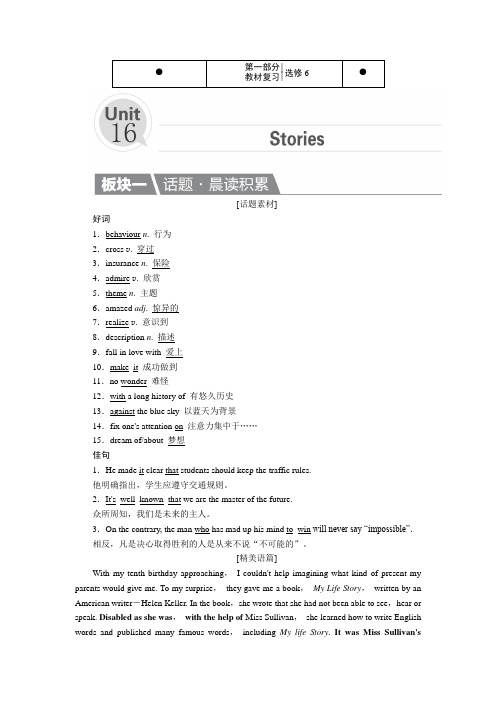
[话题素材]好词1.behaviour n. 行为2.cross v. 穿过3.insurance n. 保险4.admire v. 欣赏5.theme n. 主题6.amazed adj. 惊异的7.realize v. 意识到8.description n. 描述9.fall in love with 爱上10.make_it 成功做到11.no wonder 难怪12.with a long history of 有悠久历史13.against the blue sky 以蓝天为背景14.fix one's attention on 注意力集中于……15.dream of/about 梦想佳句1.He made it clear that students should keep the traffic rules.他明确指出,学生应遵守交通规则。
2.It's_well_known_that we are the master of the future.众所周知,我们是未来的主人。
3.On the contrary, the man who has mad up his mind to_win will never say “impossible”.相反,凡是决心取得胜利的人是从来不说“不可能的”。
[精美语篇]With my tenth birthday approaching,I couldn't help imagining what kind of present my parents would give me. To my surprise,they gave me a book,My Life Story,written by an American writer-Helen Keller. In the book,she wrote that she had not been able to see,hear or speak. Disabled as she was,with the help of Miss Sullivan,she learned how to write English words and published many famous words,including My life Story. It was Miss Sullivan'scontinuous encouragement and instruction that inspired her to live her life to the fullest.I was impressed with the writer's determination and Miss Sullivan's kindness. Whenever I felt depressed because of learning difficulties,I would read the book once more.高频单词1.abandon (v t.) 抛弃,遗弃→abandoned (adj.) 被抛弃的,被遗弃的2.preserve (v t.) 保护,保存→preserver (n.) 保护者,维护者3.witness (v.) 目击→wit (n.) 机智,风趣;能力,智力4.occur (v i.) 发生→occurrence (n.) 发生5.tremble (v i.) 颤抖,发抖6.particularly (ad v.) 特别地,特定地→particular (adj.) 特别的,特定的,特有的7.characteristic (adj.) 典型的(n.) 特点,特征→character (n.) 性格;人物8.gather (v i. & v t.) 聚集9.sympathy (n.) 同情→sympathize (v.) 同情→sympathetic (adj.) 有同情心的10.burst (v i.) 爆炸;冲;闯11.significance (n.) 重要性;意义→significant (adj.) 重大的,有意义的12.abnormal (adj.) 反常的,不正常的→normal (adj.) 正常的,通常的13.origin (n.) 起源,开端;出身→original (adj.) 最初的,起源的14.restriction (n.) 限制,约束→restrict (v t.) 限制,约束15.unbearable (adj.) 不能忍受的→bearable (adj.) 可忍受的→bear(v.) 忍受16.former (adj.) 以前的17.precise (adj.) 准确的,精确的18.precious (adj.) 宝贵的,珍贵的19.expand (v.) 扩大,扩充→expansion (n.) 扩张20.complex (adj.) 复杂的21.apparent (adj.) 明显的,显而易见的→apparently (ad v.) 看来,似乎22.applaud (v i.) & (v t.) 鼓掌→applause (n.) 鼓掌,掌声重点短语1.come into view 出现2.knock sb. over 撞倒某人3.once upon a time 从前4.block out 堵住5.in a way 从某种程度上说6.on one's side 侧身7.split up (使)解散;决裂8.on the way to 在去……的路上9.name...after 以……的名字给某人/某物命名10.come across 偶然遇见11.hold up 支撑起12.count on 依靠13.figure out 理解14.end up 以……结束,以……告终15.put up with 容忍,忍受16.in particular 特别,尤其热点句型1.as if 引导表语从句Another man, lying on his side, looks_as_if he is trying to get up.(教材P6)另一个侧身躺着的人看上去好像在试图站立起来。
高考英语一轮复习UnitStories课件北师大版选修
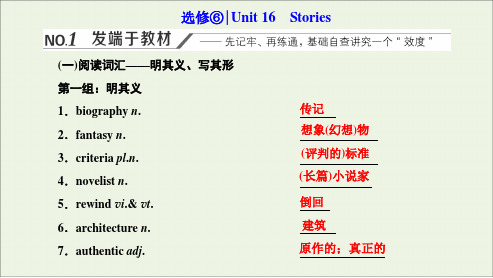
2.①There was a burst of laughter in the next room.
Ⅲ.选词填空 1.suffer/suffer from
Farmers would ① suffer great hunger when they ② suffer from the heavy flood. 2.preserve/reserve ①My friend here helped me reserve a double room and a single room the day before last weekend. ②In summer, large crops of fruit may be preserved by freezing or bottling. 3.burst in/burst into ①Suddenly the door opened and a group of children burst in . ②He was just about to leave when someone burst into his room.
Ⅳ.写出加蓝部分在语境中的词性及含义
1.①As we all know, Wolong is the largest nature preserve for pandas.
n.自然保护区
②We have taken effective measures to preserve our natural resources. vt.保护
(2020·全国卷Ⅱ满分作文)Now that they were poison-free, 背佳句
we were told we could enjoy some newly-picked ones.
高中英语北师大版选修六Unit16Stories 教案设计
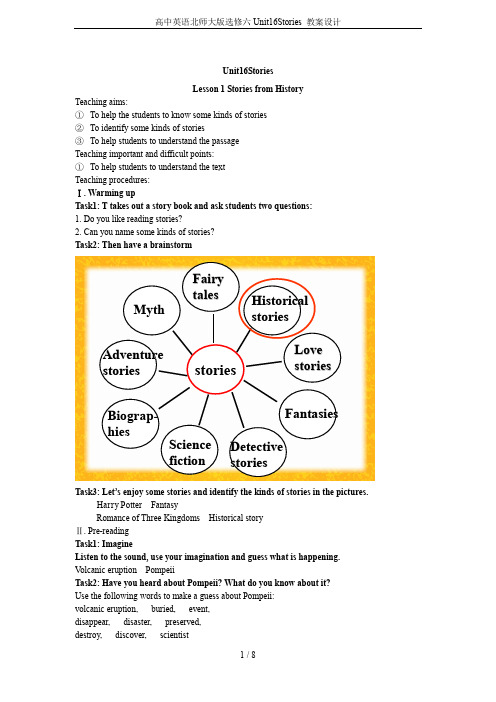
Unit16StoriesLesson 1 Stories from HistoryTeaching aims:① To help the students to know some kinds of stories ② To identify some kinds of stories③ To help students to understand the passage Teaching important and difficult points: ① To help students to understand the text Teaching procedures: Ⅰ. Warming upTask1: T takes out a story book and ask students two questions: 1. Do you like reading stories?2. Can you name some kinds of stories? Task2: Then have a brainstormstoriesFairy talesDetective storiesLove stories FantasiesHistorical storiesBiograp-hiesScience fictionAdventure stories MythTask3: Let’s enjoy some stories and ident ify the kinds of stories in the pictures. Harry Potter FantasyRomance of Three Kingdoms Historical story Ⅱ. Pre-reading Task1: ImagineListen to the sound, use your imagination and guess what is happening. V olcanic eruption PompeiiTask2: Have you heard about Pompeii? What do you know about it? Use the following words to make a guess about Pompeii: volcanic eruption, buried, event, disappear, disaster, preserved, destroy, discover, scientistⅢ. ReadingTask1: Listen and read to get the main idea of the passage:It is about a city named Pompeii , which was buried by a volcanic eruption and discovered again by some scientists 1,600 years later.Task2: Second reading:Task3: Sum up: fill in the blanksPliny was a Roman writer who had _________ and wrote about a _________ eruption which ________ on August 24th,79AD and it was of Mt. Vesuvius. The tragedy had left a deep __________ on Pliny whose uncle died in the event. The whole towns and villages were _________ by the ashes of Mt Vesuvius. By 1748, scientists started to ________the ancient city Pompeii. It is like a “time capsule” __________a frozen moment in history. Not only the buildings and objects of Pompeii attract the people, but also the forms of the people caught in the _______ that made the city a __________ to human history. The bodies of people died in Pompeii showed their exact _______of getting together for_________. Today, since excavations started, people and scientists visit Pompeii every year to learn more about the ______________. In this way, the city __________ nearly 2,000 years after its ________.Ⅳ. Post-readingDiscussion:What natural disasters do you know?If you meet one of them, what will you do?Ⅴ. Assignments:1.Read the text again and find out some useful words and expressions.2. Finish the exercise3&4 in Page6-7Lesson 2 Name StoriesTeaching Aim:①.Learn to talk about the origin and hidden story behind one’s name.②. Learn to make suggestions, assumptions and guesses.③ Help to improve students’ listening skillsTeaching difficult and important points①.talk about the origin and hidden story behind one’s name②.improve students’ listening skillsTeaching procedures:Ⅰ. Warming upLook at the pictures of Jackie Chan and Sun Yet-sun then ask students:Who is he?What about his Chinese name?What about his original Chinese name?Task1:①.Compared their Chinese names, do you know the history of their name. Why did they change their name?②. Do their name have any specific meanings?His original name was Chen Gangsh(陈港生),which tells his birthplace. In his acting career, he first had a stage name(艺名)Chen Yuanlong(陈元龙). Later, a film director gave him another stage name Chenglong(成龙), which has two aspects of meanings: the first one is to express the director’s wish that Cheng could become famous, just like a dragon- the symbol of China; the second it is hoped that Cheng would follow the example of another well-known Chinese martial star(功夫明星), Li Xiaolong(李小龙).Ⅱ. Speaking. Work in pairs.1. What’s your name?2. What does it mean?3. And why did your parents give you the name?Ⅲ. Listening.Task1: Listen to the three students talking about their names. Which of them matches the following descriptions?1. This student has parents who wanted their child to be a “pillar of societ y”.( )2.This student has a grandfather who migrated from northern Wales to Manchester.( )3. This student probably has an ancestor who made things from metal. ( )4. This student has parents who were inspired by a great violinist Itzhak Perlman. ( )5. This student is named a purple flower.( )6. This student has parents who wanted their daughter to be as strong and capable as any boy.( )Taks2: Function fileListen to the extracts from the monologues and complete the Function File.Expressing guesses, assumptions, beliefsⅣ. ReadingTask1: Let’s read a name storyComplete the passage with these phrasal verbs, exercise 5Task2: Culture LinkingWestern namesApart from their surname or last name or family name in Britain or the US, most British and American children are given two personal names by their parents, a first name and a middle name. These names are sometimes called Christian names or given names. Some people have only one given name, a few have three or more.Parents usually decide on given names for their children before they are born. In some families the oldest boy is given the same name as his father. In the US the word junior or senior, or a number, is added after the name and surname to make it clear which person is being referred to.Many popular names come from the Bible, e.g. Jacob, Joshua and Matthew, Mary, Rebecca and Sarah, though this does not imply that the people who choose them are religious. Other people give their children the name of somebody they admire, such as a famous sports personality, or a film or pop star. In Britain the names William and Harry have become common again since the sons of Prince Charles were given these names.Ⅴ. AssignmentsLesson 3 Life StoriesTeaching Aim:① Learn some useful reading strategy: predicting, general idea, and working out the meaning of important words from the context.②. Learn to retell a story according to time order③. Accumulate some synonyms and antonymsTeaching important and difficult points①.Learn some useful reading strategy②.Retell a story according to time orderTeaching procedures:Ⅰ. Warming upTask1: Look at the picture and talk something about Helen KellerTask2:Talk about some famous people and their eventsⅡ. Pre-readingIntroduction about Helen KellerHelen Keller (June 27, 1880 - June 1, 1968), was an author, lecturer, and humanitarian whose unusual life and dedicated 献身的work had an international influence on the lives of the disabled (残疾人). She became blind and deaf at the age of 19 months through a damaging brain fever and could communicate only through hysterical 歇斯底里laughter or violent tantrums 发怒. But, with the help of her teacher Anne Mansfield Sullivan, Keller learned to read barilla盲文and to write by using a special typewriter. Bibliography自传: Keller, Helen, The Story of My Life and Teacher (1955); Waite, H. E., Valiant Companions: Helen Keller and Anne Sullivan Macy (1959);Ⅲ. ReadingTask1: Reading strategy (1)Before reading, look at the title, pictures and the first couples of lines of the text.Look for clues to help you predict what kind of text it is and what it is about.Reading strategy(2)Read the text to get the general idea. Ignore words you don’t know.Read the text again. Try to work out the meaning of important new words. Use a dictionary if you can’t.Read any comprehensive questions and try to think of possible answers. Then find answers to questions in the text.Task2: read the text and answer the following questions:1. How was Helen Keller different from other children?2. Why was her teacher so important to her?3. How did she learn new words?4. Why did she feel happy when she understood the meaning of the word “water”?5. Why was the word “love” so difficult for Helen to understand?6. Why did she think that love might be the sun?7. How did she learn the word “think”?8. What do the words “love” and “think” have in common?Task3: retell the story according to the cluesCan you figure out the whole process of Helen’s learning ?Some of the clues are given here:①. getting to know Sullivan …getting②. to know some words which can be touched…③.the mystery of language was revealed to her …④.getting to understand some abstract words.Ⅳ. Post-readingDiscussion:What kind of teacher do you think Anne Sullivan is?Try to use as many adjective words as you can:Ⅴ. Language points:1.feel +名词,感到某事情感或触摸到某物。
2017届一轮复习北师大版 选修6 Unit16 课件

9. more than 250 years after scientists found the city,thousands
of tourists and hundreds of scientists visit Pompeii every year 10. to learn (learn) more about the ancient world.
2. knock sb.over 3. once upon a time 4. block out
出现
撞倒某人
从前
堵住
5. in a way
6. on one’s side
从某种程度上说
侧身
7. on the way to
8. pay rise
在去„„的路上
增加工资
答案
9. split up 10. name...after e across 12. hold up 13.count on 14. figure out 15. end up 16. in particular 17. put up with 18. now that
重要的;重大的;显著的
生动的,逼真的
答案
21.abnormal (adj.)
normal (adj.)
反常的,不正常的 正常的 令人钦佩的
22.admirable (adj.)
admire (vt.)
钦佩
严重的;严厉的
23.severe (adj.)
24.restriction (n.)
限制,约束
限制,限定
restrict (vt.)
25.unbearable (adj.)
不能忍受的
可忍受的 容忍,忍受
高三英语(北师大版)一轮复习教师用书选修六:Unit16Stories
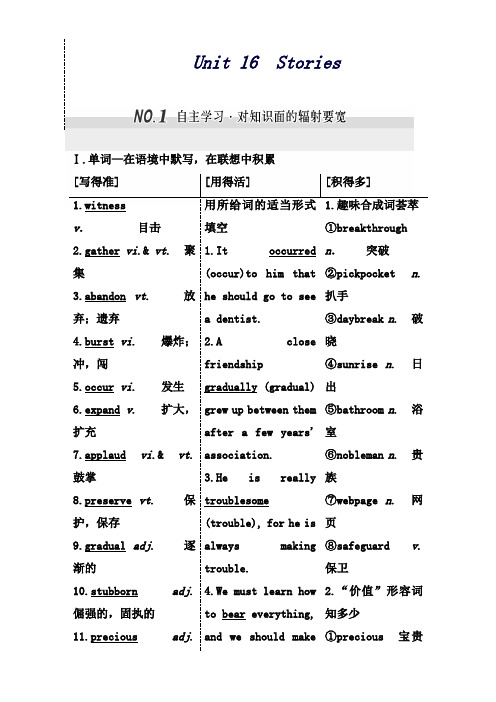
Unit 16 StoriesⅠ.单词—在语境中默写,在联想中积累1.witness v . 目击2.gather vi .& vt . 聚集3.abandon vt . 放弃;遗弃4.burst vi . 爆炸;冲,闯5.occur vi . 发生6.expand v . 扩大,扩充7.applaud vi .& vt . 鼓掌8.preserve vt . 保护,保存9.gradual adj . 逐渐的10.stubbornadj . 倔强的,固执的 11.precious adj . 填空 1.Itoccurred (occur)to him that he should go to see a dentist. 2.A close friendship gradually (gradual) grew up between them after a few years' association.3.He is really troublesome(trouble), for he is always making trouble. 4.We must learn how to bear everything, and we should make ①breakthroughn . 突破 ②pickpocket n .扒手③daybreak n . 破晓④sunrise n . 日出⑤bathroom n . 浴室⑥nobleman n . 贵族⑦webpage n . 网页⑧safeguardv . 保卫 2.“价值”形容词知多少①precious 宝贵宝贵的,珍贵的 plexadj . 复杂的 13.eager adj . 渴望的,热衷的 14.breakthroughn . 突破,重大发现 15.sorrow n . 悲伤,难过 16.troublesome adj . 引起麻烦的 17.discourage vt .使泄气,使灰心→discouraged adj .气馁的,泄气的→courage n .勇气→encourage vt .鼓励 18.suffering n .痛苦,困难→suffer v .遭受 19.musical adj .音乐的 n . 音乐剧,音乐片→music n .音乐→musician n .音乐家 20.abnormal adj .反常的,不正常的→normal adj .正常的;通常的 it bearable,_although it is unbearable sometimes.(bear)5.The old soldier's health suffered greatly from all the sufferings that he went through during the war.(suffer)6.The failure in the English contest discouraged my brother. What's worse, he felt discouragedin other subjects. In order to help him regain his courage and get relaxed, my parents and I all encouraged him to takea trip.(discourage) 7.It is reported that Fan Bingbing is 的 ②valuable 有价值的③worth 有……价值的 ④worthy 有价值的⑤priceless 无价的⑥worthless/valu eless 无价值的3.后缀some 形容词集锦①troublesome引起麻烦的②handsome 英俊的③awesome 令人敬畏的④boresome 烦人的⑤fearsome 可怕的 4.盘点dis前缀单词①dislike vt . 不21.admirable adj.令人钦佩的,极佳的→admire vt.尊敬;钦佩→admiration n.尊敬;钦佩22.significance n.重要性,意义→significant adj.重大的;有重要意义的23.origin n.起源,开端;出身→original adj.最初的;起先的24.restriction n.限制,约束→restrict vt.限制,约束25.particularly adv.特别地,特定地→particular adj.特别的;挑剔的26.unbearable adj.不能忍受的→bearable adj.可忍受的→bear v.忍耐particular aboutdress, particularlywhen she attends theopening ceremony ofher newfilm.(particularly)8.Most studentsthink itsignificant to jointhe English corner,though a few haven'trealized thesignificance ofit.(significance)9.Because of hisadmirable successin playingbasketball, manyteenagers admireJeremy Lin and thinkhe deserves theiradmiration.(admirable)10.It is normal thatpatients will have喜欢②dishonest adj.不诚实的③disagree vi.不同意④disappoint vt.使失望⑤disadvantage n.不利条件⑥disappear vi.消失⑦discourage vt.使泄气⑧disabled adj.残疾的5.聚焦ab开头单词①abundant adj.丰富的②abnormal adj.不正常的③abstract adj.抽象的④absence n.缺席;缺乏⑤absorb v. 吸some abnormal behavior when they are in low spirits.(abnormal) 收⑥abandon v. 抛弃,逃离Ⅱ.短语—在应用中记牢,在归纳中记多e_into_view出现 2.knock_sb._over 撞倒某人 3.once_upon_a_time 从前 4.block_out 堵住 5.in_a_way 从某种程度上说 6.on_one's_side 侧身,在某人一边 7.split_up_ 断绝关系;分成小部分 _...after 以……命名 e_across_偶然遇见;被理解 10.hold_up 支撑起;延误,推迟 11.count_on 依靠;指望;确信 12.figure_out理解 13.end_up_以……结束 选用左栏短语填空 1.A boywas knocked_over by a passing carbut fortunately he was not hurt severely. 2.Noise is coming to the point where we can't put_up_with it. 3.When the car goes around the corner, our house will come_into_view.4.After a broken promise, it is hard to count_on a person.5.I came_across one of my old friends when I wentshopping yesterday afternoon. 6.You can refer_to a dictionary when you come across a new word. 7.We put a curtain across the window to block_out the 1.way 短语全接触 ①in a way 在某种程度上②all the way 一路上;自始至终 ③by the way顺便说一下④in no way 一点也不;决不⑤in this way用这种方法⑥in the way挡道;碍事 ⑦onthe way 在途中⑧No way! [俚]没门! ⑨by way of 路经;经过 ⑩across the way在……对面2.“指望,依靠”短语大全 ①count on②rely on ③lean on14.put_up_with 容忍,忍受 15.in_particular特别,尤其 16.refer_to__ 查阅;提到;涉及;提交 sunlight. ④depend on ⑤figure on ⑥calculate onⅢ.句式—在解读中学懂,在仿写中学通understood the key tolanguage, she was very eager to learn more and use it as much as she could.既然海伦理解了语言之谜,她非常渴望学习更多的词语并且尽可能多地使now that 引导原因状语从句。
高中英语Unit16StoriesPeriodSeven教案含解析北师大版选修6
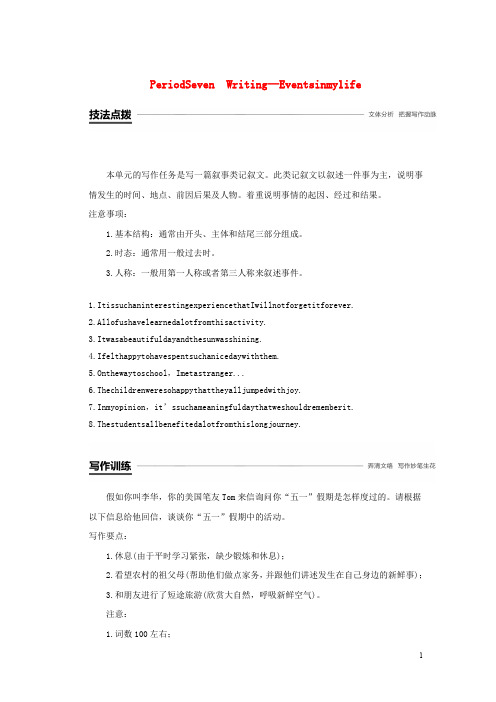
PeriodSeven Writing—Eventsinmylife本单元的写作任务是写一篇叙事类记叙文。
此类记叙文以叙述一件事为主,说明事情发生的时间、地点、前因后果及人物。
着重说明事情的起因、经过和结果。
注意事项:1.基本结构:通常由开头、主体和结尾三部分组成。
2.时态:通常用一般过去时。
3.人称:一般用第一人称或者第三人称来叙述事件。
1.ItissuchaninterestingexperiencethatIwillnotforgetitforever.2.Allofushavelearnedalotfromthisactivity.3.Itwasabeautifuldayandthesunwasshining.4.Ifelthappytohavespentsuchanicedaywiththem.5.Onthewaytoschool,Imetastranger...6.Thechildrenweresohappythattheyalljumpedwithjoy.7.Inmyopinion,it’ssuchameaningfuldaythatweshouldrememberit.8.Thestudentsallbenefitedalotfromthislongjourney.假如你叫李华,你的美国笔友Tom来信询问你“五一”假期是怎样度过的。
请根据以下信息给他回信,谈谈你“五一”假期中的活动。
写作要点:1.休息(由于平时学习紧张,缺少锻炼和休息);2.看望农村的祖父母(帮助他们做点家务,并跟他们讲述发生在自己身边的新鲜事);3.和朋友进行了短途旅游(欣赏大自然,呼吸新鲜空气)。
注意:1.词数100左右;2.可适当增加细节,以使行文连贯。
参考词汇:五一假期MayDayholiday审题写作要求是介绍五一假期里所做的事情。
写作时应注意下面几点:1.确定文体:这是一篇叙事类记叙文,写作中应注意叙事类记叙文的常规格式。
Unit 16 Stories—Lesson 3《Life Stories》教案(北师大选修6)
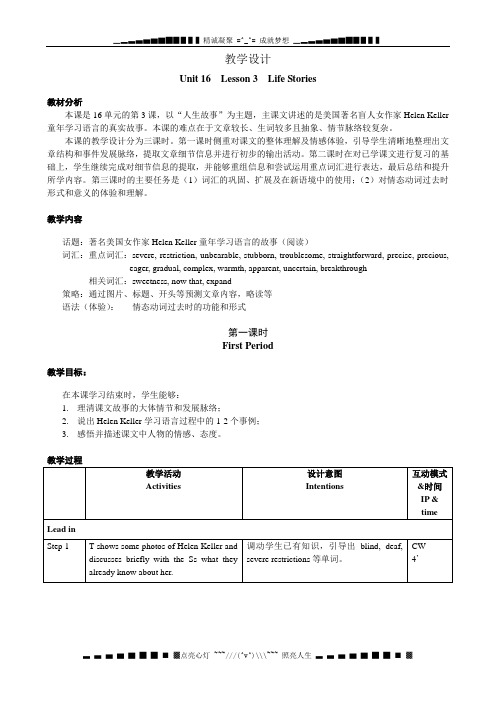
教学设计Unit 16 Lesson 3 Life Stories教材分析本课是16单元的第3课,以“人生故事”为主题,主课文讲述的是美国著名盲人女作家Helen Keller 童年学习语言的真实故事。
本课的难点在于文章较长、生词较多且抽象、情节脉络较复杂。
本课的教学设计分为三课时。
第一课时侧重对课文的整体理解及情感体验,引导学生清晰地整理出文章结构和事件发展脉络,提取文章细节信息并进行初步的输出活动。
第二课时在对已学课文进行复习的基础上,学生继续完成对细节信息的提取,并能够重组信息和尝试运用重点词汇进行表达,最后总结和提升所学内容。
第三课时的主要任务是(1)词汇的巩固、扩展及在新语境中的使用;(2)对情态动词过去时形式和意义的体验和理解。
教学内容话题:著名美国女作家Helen Keller童年学习语言的故事(阅读)词汇:重点词汇:severe, restriction, unbearable, stubborn, troublesome, straightforward, precise, precious, eager, gradual, complex, warmth, apparent, uncertain, breakthrough相关词汇:sweetness, now that, expand策略:通过图片、标题、开头等预测文章内容,略读等语法(体验):情态动词过去时的功能和形式第一课时First Period教学目标:在本课学习结束时,学生能够:1.理清课文故事的大体情节和发展脉络;2.说出Helen Keller学习语言过程中的1-2个事例;3.感悟并描述课文中人物的情感、态度。
*表示可灵活处理的活动。
第二课时Second Period 教学目标在本课学习结束时,学生能够:1.运用所学单词和短语描述Helen的学习语言的过程;2.讨论Helen和/或Anne成功的原因;*表示可灵活处理的活动。
【教学设计】选修六Unit16-lesson1(北师大)1
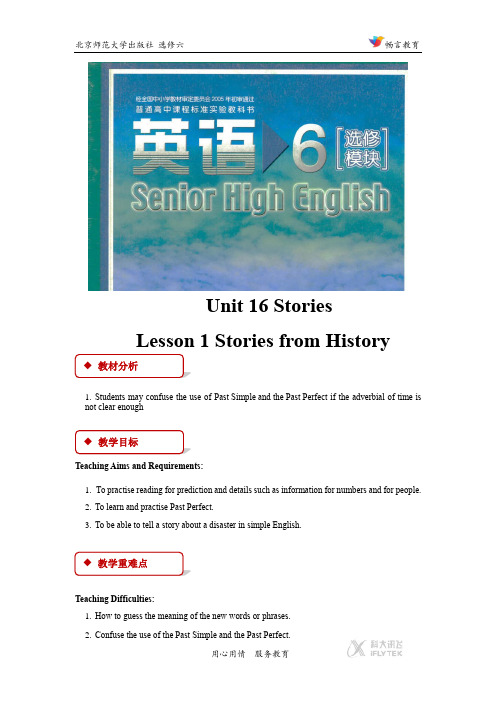
Unit 16 StoriesLesson 1 Stories from History1.Students may confuse the use of Past Simple and the Past Perfect if the adverbial of time isnot clear enoughTeaching Aims and Requirements:1.To practise reading for prediction and details such as information for numbers and for people.2.To learn and practise Past Perfect.3.To be able to tell a story about a disaster in simple English.Teaching Difficulties:1.How to guess the meaning of the new words or phrases.2.Confuse the use of the Past Simple and the Past Perfect.Teaching Aids:A small blackboard, a tape recorder and some pictures.Teaching Precedures:Ⅰ. RevisionGet students to talk about the kinds of stories and it’s better to cite a book name for example.Ⅱ. Lead in1.Show students several pictures about the city of Pompeii, attracting their attention to the point, and give them a brief introduction of the city. Then ask them to talk about the disaster in simple words or the key words in Ex 1.2. Teach some new words.Ⅲ. ReadingTask 1 Look at the title, and guess what the passage talks about.Task 2 Read the passage for the first time and get the main idea of the whole passage.Task 3 Read for the second time and find out the information related to the certain numbers.August 24,79AD 1600 1748 250Task 4 Read for the third time and find out the information related to the certainpersons.Pliny some scientists tourists one person who is prayinganother person who is trying to get upTask 5 Understanding of the whole passageCheck the students’ understanding of the whole passage by answering the following questions:1.What is the article about?。
高中英语北师大版模块6【教学设计】选修六Unit16-lesson11
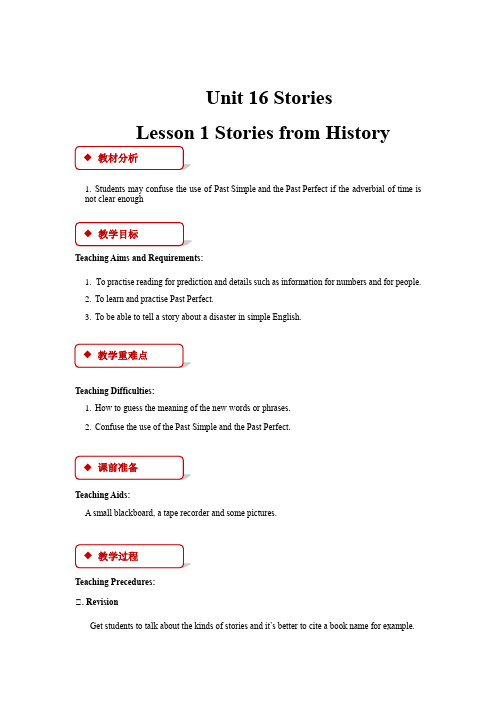
Unit 16 StoriesLesson 1 Stories from History1.Students may confuse the use of Past Simple and the Past Perfect if the adverbial of time isnot clear enoughTeaching Aims and Requirements:1.To practise reading for prediction and details such as information for numbers and for people.2.To learn and practise Past Perfect.3.To be able to tell a story about a disaster in simple English.Teaching Difficulties:1.How to guess the meaning of the new words or phrases.2.Confuse the use of the Past Simple and the Past Perfect.Teaching Aids:A small blackboard, a tape recorder and some pictures.Teaching Precedures:Ⅰ. RevisionGet students to talk about the kinds of stories and it’s better to cite a book name for example.Ⅱ. Lead in1.Show students several pictures about the city of Pompeii, attracting their attention to the point, and give them a brief introduction of the city. Then ask them to talk about the disaster in simple words or the key words in Ex 1.2. Teach some new words.Ⅲ. ReadingTask 1 Look at the title, and guess what the passage talks about.Task 2 Read the passage for the first time and get the main idea of the whole passage.Task 3 Read for the second time and find out the information related to the certain numbers.August 24,79AD 1600 1748 250Task 4 Read for the third time and find out the information related to the certainpersons.Pliny some scientists tourists one person who is prayinganother person who is trying to get upTask 5 Understanding of the whole passageCheck the students’ understanding of the whole passage by answering the following questions:1.What is the article about?2.Why does the article describe Pompeii as a “ time capsule ”?3.Who wrote about the eruption of Vesuvius?4.What had Pompeii been like before the eruption?5.What can you see if you walk in the streets of Pompeii today? Task 6True of False?a)Pliny’s uncle died in the terrible volcanic eruption in Pompeii.b)Pompeii’s ancient architecture,statues,decorated walls and so on impressed the peopletoday most.c)When the volcano erupted, the peole in Pompeii were all praying.d)Every year many visitors came to Pompeii to dig out the ancient city and learnabout the ancient world.。
高考英语一轮复习 Unit 16 Stories讲练精品学案 北师大版选修6
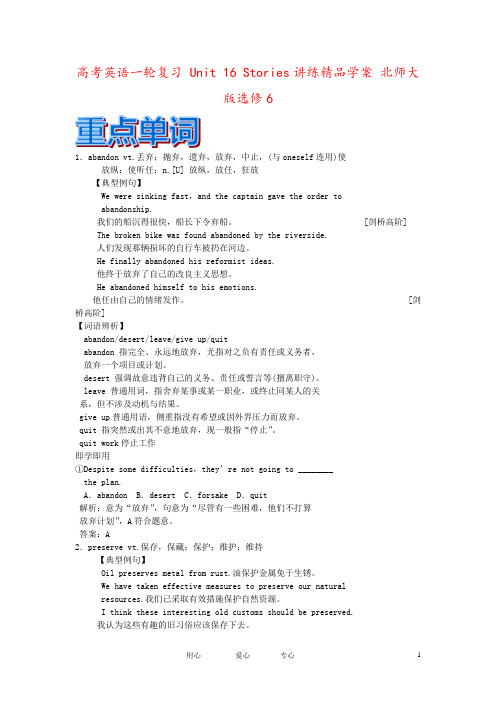
高考英语一轮复习 Unit 16 Stories讲练精品学案北师大版选修61.abandon vt.丢弃;抛弃,遗弃,放弃,中止,(与oneself连用)使放纵;使听任;n.[U] 放纵,放任,狂放【典型例句】We were sinking fast,and the captain gave the order toabandonship.我们的船沉得很快,船长下令弃船。
[剑桥高阶] The broken bike was found abandoned by the riverside.人们发现那辆损坏的自行车被扔在河边。
He finally abandoned his reformist ideas.他终于放弃了自己的改良主义思想。
He abandoned himself to his emotions.他任由自己的情绪发作。
[剑桥高阶]【词语辨析】abandon/desert/leave/give up/quitabandon 指完全、永远地放弃,尤指对之负有责任或义务者,放弃一个项目或计划。
desert 强调故意违背自己的义务、责任或誓言等(擅离职守)。
leave 普通用词,指舍弃某事或某一职业,或终止同某人的关系,但不涉及动机与结果。
give up普通用语,侧重指没有希望或因外界压力而放弃。
quit 指突然或出其不意地放弃,现一般指“停止”。
quit work停止工作即学即用①Despite some difficulties,they’re not going to ________the plan.A.abandon B.desert C.forsake D.quit解析:意为“放弃”,句意为“尽管有一些困难,他们不打算放弃计划”,A符合题意。
答案:A2.preserve vt.保存,保藏;保护;维护;维持【典型例句】Oil preserves metal from rust.油保护金属免于生锈。
- 1、下载文档前请自行甄别文档内容的完整性,平台不提供额外的编辑、内容补充、找答案等附加服务。
- 2、"仅部分预览"的文档,不可在线预览部分如存在完整性等问题,可反馈申请退款(可完整预览的文档不适用该条件!)。
- 3、如文档侵犯您的权益,请联系客服反馈,我们会尽快为您处理(人工客服工作时间:9:00-18:30)。
[话题素材]好词1.behaviour n. 行为2.cross v. 穿过3.insurance n. 保险4.admire v. 欣赏5.theme n. 主题6.amazed adj. 惊异的7.realize v. 意识到8.description n. 描述9.fall in love with 爱上10.make_it 成功做到11.no wonder 难怪12.with a long history of 有悠久历史13.against the blue sky 以蓝天为背景14.fix one's attention on 注意力集中于……15.dream of/about 梦想佳句1.He made it clear that students should keep the traffic rules.他明确指出,学生应遵守交通规则。
2.It's_well_known_that we are the master of the future.众所周知,我们是未来的主人。
3.On the contrary, the man who has mad up his mind to_win will never say “impossible”.相反,凡是决心取得胜利的人是从来不说“不可能的”。
[精美语篇]With my tenth birthday approaching,I couldn't help imagining what kind of present my parents would give me. To my surprise,they gave me a book,My Life Story,written by an American writer-Helen Keller. In the book,she wrote that she had not been able to see,hear or speak. Disabled as she was,with the help of Miss Sullivan,she learned how to write English words and published many famous words,including My life Story. It was Miss Sullivan'scontinuous encouragement and instruction that inspired her to live her life to the fullest.I was impressed with the writer's determination and Miss Sullivan's kindness. Whenever I felt depressed because of learning difficulties,I would read the book once more.高频单词1.abandon (v t.) 抛弃,遗弃→abandoned (adj.) 被抛弃的,被遗弃的2.preserve (v t.) 保护,保存→preserver (n.) 保护者,维护者3.witness (v.) 目击→wit (n.) 机智,风趣;能力,智力4.occur (v i.) 发生→occurrence (n.) 发生5.tremble (v i.) 颤抖,发抖6.particularly (ad v.) 特别地,特定地→particular (adj.) 特别的,特定的,特有的7.characteristic (adj.) 典型的(n.) 特点,特征→character (n.) 性格;人物8.gather (v i. & v t.) 聚集9.sympathy (n.) 同情→sympathize (v.) 同情→sympathetic (adj.) 有同情心的10.burst (v i.) 爆炸;冲;闯11.significance (n.) 重要性;意义→significant (adj.) 重大的,有意义的12.abnormal (adj.) 反常的,不正常的→normal (adj.) 正常的,通常的13.origin (n.) 起源,开端;出身→original (adj.) 最初的,起源的14.restriction (n.) 限制,约束→restrict (v t.) 限制,约束15.unbearable (adj.) 不能忍受的→bearable (adj.) 可忍受的→bear(v.) 忍受16.former (adj.) 以前的17.precise (adj.) 准确的,精确的18.precious (adj.) 宝贵的,珍贵的19.expand (v.) 扩大,扩充→expansion (n.) 扩张20.complex (adj.) 复杂的21.apparent (adj.) 明显的,显而易见的→apparently (ad v.) 看来,似乎22.applaud (v i.) & (v t.) 鼓掌→applause (n.) 鼓掌,掌声重点短语1.come into view 出现2.knock sb. over 撞倒某人3.once upon a time 从前4.block out 堵住5.in a way 从某种程度上说6.on one's side 侧身7.split up (使)解散;决裂8.on the way to 在去……的路上9.name...after 以……的名字给某人/某物命名10.come across 偶然遇见11.hold up 支撑起12.count on 依靠13.figure out 理解14.end up 以……结束,以……告终15.put up with 容忍,忍受16.in particular 特别,尤其热点句型1.as if 引导表语从句Another man, lying on his side, looks_as_if he is trying to get up.(教材P6)另一个侧身躺着的人看上去好像在试图站立起来。
2.now that “既然,由于”,引导原因状语从句Now_that Helen understood the key to language, she was very eager to learn more and use it as much as she could.(教材P11)既然海伦理解了语言之谜,她非常渴望学习更多的词语并且尽可能多地使用它们。
3.unless引导条件状语从句Her words puzzled me very much because I didn't then understand anything unless I touched it. (教材P11)她的话使我感到非常困惑,因为那时我若不用手触摸,就什么也不理解。
4.think it+adj.+that...I thought_it_strange that my teacher couldn't show me love.(教材P11)我觉得很奇怪,我的老师不能对我说明爱。
教材复现在空白处填入适当的内容(1个单词)或括号内单词的正确形式。
1.This ________ (particular) sad event left a deep impression on Pliny who had lost an uncle in the eruption.答案:particularly2.Before the eruption occurred, it had been a booming Roman city ________ temples, markets, restaurants and theatres.答案:with3.________,much more than buildings and objects, it's the forms of the people who were caught in the disaster that have made the city a monument to human history.答案:However4.In this way, the city, ________ the world had once forgotten, lives on nearly 2,000 years after its loss.答案:which5.Anne Sullivan was ________ (bring) in to help Helen.答案:brought6.Helen would have to learn to understand words ________ (spell) on her hand.答案:spelled/spelt7.Then ________ (sudden), Helen had a burst of understanding; the movement of the fingers meant the cool water flowing over her hand.答案:suddenly8.Helen then felt the warmth of the sun ________ (shine) on them.答案:shining9.The word “think” was also a difficult one for Helen but she had a breakthrough while ________ (work) on a simple task.答案:working10.________ that vivid moments, Helen finally understood the beautiful truth of the word “love”.答案:In1abandon vt.抛弃,遗弃,离弃;放弃;中止It looked abandoned.(P5)它看起来像被遗弃了。
(1)abandon sb. (不顾责任、义务等)离弃/遗弃/抛弃某人abandon (doing) sth. 放弃(做)某事abandon oneself to... 沉湎于……,放纵(感情) (to为介词)abandon hope (of doing sth.) 放弃(做某事的)希望(2)abandon n. 放任;放纵with abandon 放纵地;纵情地(3)abandoned adj. 被遗弃的;自暴自弃的;无耻的;堕落的图解助记abandon①[2014·陕西高考]I wish that sports day could be abandoned and replaced with some other less competitive event.我希望运动会能够被放弃或由一些更不具有竞争性的运动所取代。
